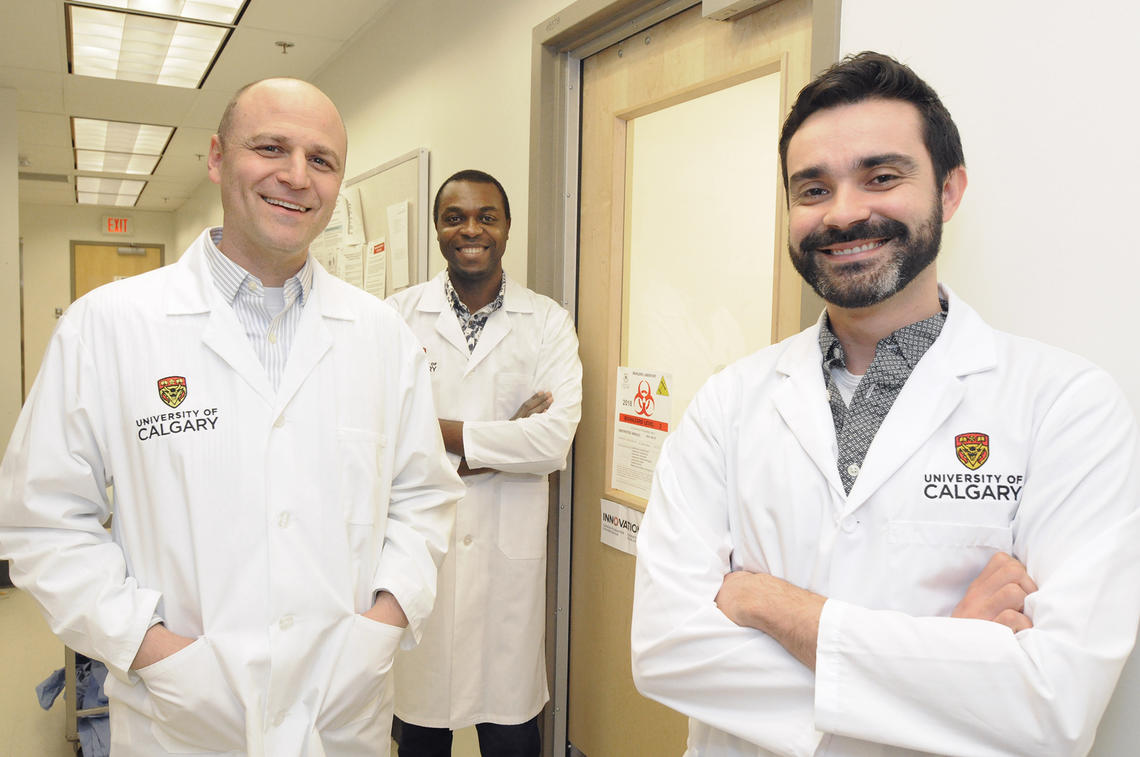
Associate professor Nathan Peters and postdoc fellows Chukwunonso Nzelu and Matheus Carneiro.
Pauline Zulueta, Cumming School of Medicine
March 9, 2018

Associate professor Nathan Peters and postdoc fellows Chukwunonso Nzelu and Matheus Carneiro.
Pauline Zulueta, Cumming School of Medicine
They’re smaller than a mosquito; they only live for about a month, yet these tiny flying insects are having a big impact on people’s health. During their short life, sand flies infect about one million people each year with the parasite Leishmania, causing a chronic disease called Leishmaniasis. The World Health Organization estimates as many as 30,000 people die annually from the disease, and hundreds of thousands of others have lifelong disfiguring scars on their skin. There is no vaccine. Treatment with intravenous medications can be extremely painful and hard to access.
In a highly specialized lab at the University of Calgary’s Cumming School of Medicine (CSM) a team of researchers is raising sand flies to understand more about transmission of the disease and our immune system’s response to it. Within the lab, the scientists created a real-life scenario; flies become naturally infected with Leishmania parasites, and then with a bite the female flies give the disease to a mouse.
“We used to think that initiating infections with these pathogens with a needle was a sufficient way to study disease in the mammalian host, but we now know that isn’t enough. There’s a huge difference in the natural progression of this disease when you compare the transmission between a fly bite and a needle,” says Nathan Peters, PhD, an associate professor cross-appointed in the CSM and the Faculty of Veterinary Medicine and member of the Snyder Institute for Chronic Diseases. “Until we fully understand the development of this disease in its many forms, we won’t be able to develop an effective vaccine.”
There are three forms of the disease. The most common results in lesions and ulcers on the skin and can lead to serious disability. Another form attacks the mucous membranes of the nose, mouth and throat, and the most serious form shows up in the spleen and liver and is fatal in 95 per cent of cases, if left untreated.
Leishmaniasis is considered a tropical disease, and is commonly found in South America, Africa the Middle East and India, but due to climate change, incidents of the disease are starting to show up in new areas including the island of Sicily, the south of France and Spain.
Dr. Bonnie Meatherall, an infectious disease specialist and assistant professor in the Department of Medicine at the CSM, treats a handful of patients each year, mostly travellers. “Many of the patients I see didn’t expect to contract this disease on their vacation. They often are on an excursion, like a common jungle adventure as part of their trip.” Meatherall suggests vacationers consider pre-travel counselling to educate themselves on the health risks even at popular destinations.
While a lot of field research is conducted at the locations where the disease is commonly spread, it can be difficult for scientists to follow the full cycle of the disease, to include how the fly became infected, through to where it contacted a human host. That’s where the Peters lab comes in. The temperature and humidity levels in the lab and constant care of a sand fly colony allows researchers to map each stage of a fly’s life and the complete development of the disease in a host.
The insectary, built with support from the Canadian Foundation for Innovation (CFI) and Alberta Economic Development and Trade, is state of the art and includes key card access, progressive negative pressure, and self-closing mechanically interlocking doors to ensure the safety of researchers and the preservation of the sand fly colony, which needs highly specialized care to thrive.
Peters says this research could have far-reaching implications in our understanding of other diseases transmitted by insects, including the malaria parasite, Plasmodium, Zika and West Nile viruses, and Lyme disease bacteria.
Peters credits UCalgary for having a ‘can-do’ attitude when he first proposed building the facility during his recruitment. “I have to say, the leadership at the Snyder Institute saw the uniqueness and potential of such a facility and were all extremely supportive,” he says.
Nathan Peters, PhD, is an associate professor in the departments of Microbiology, Immunology and Infectious Diseases at the CSM, and in the Department of Comparative Biology and Experimental Medicine at the Faculty of Veterinary Medicine.